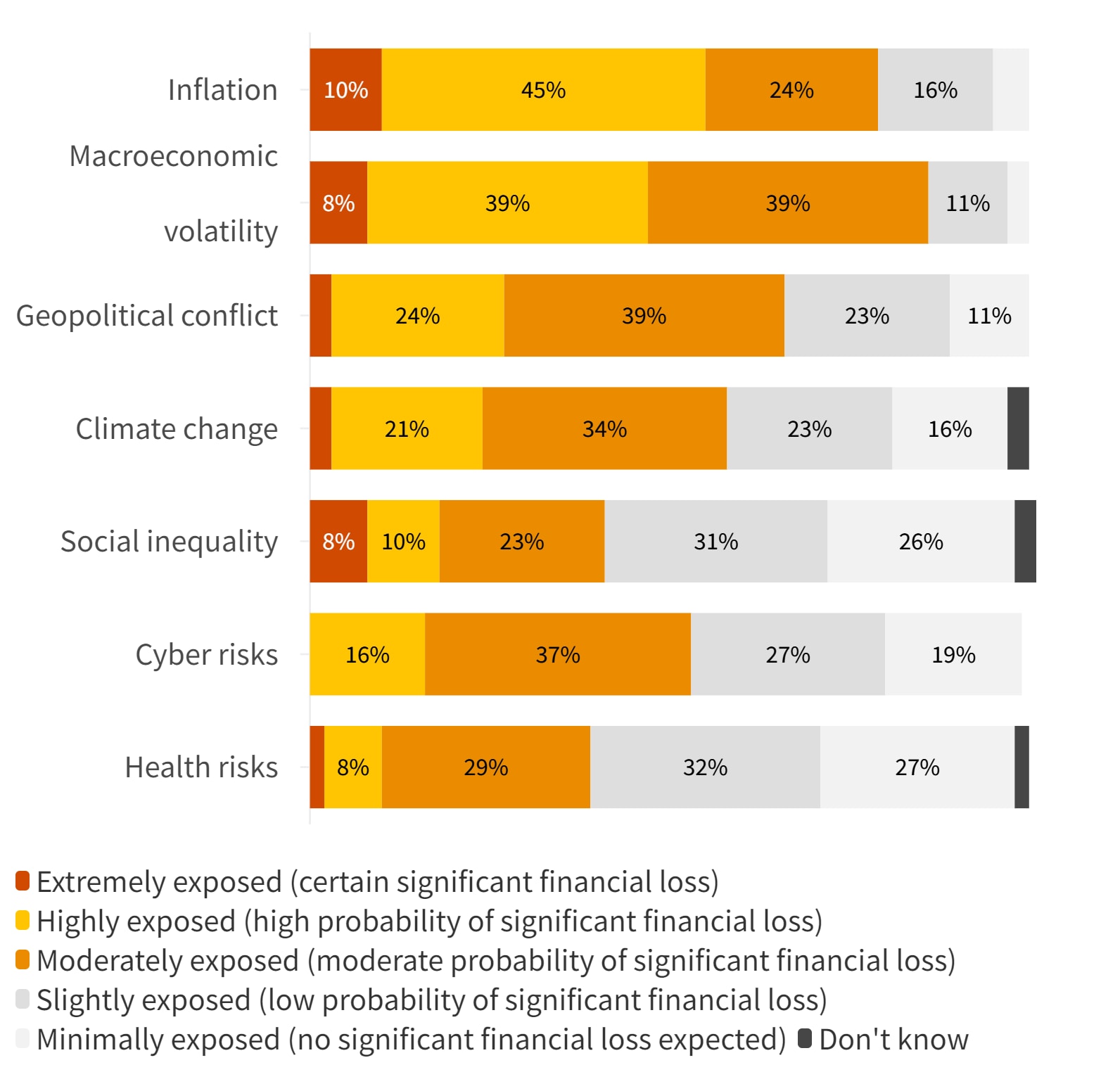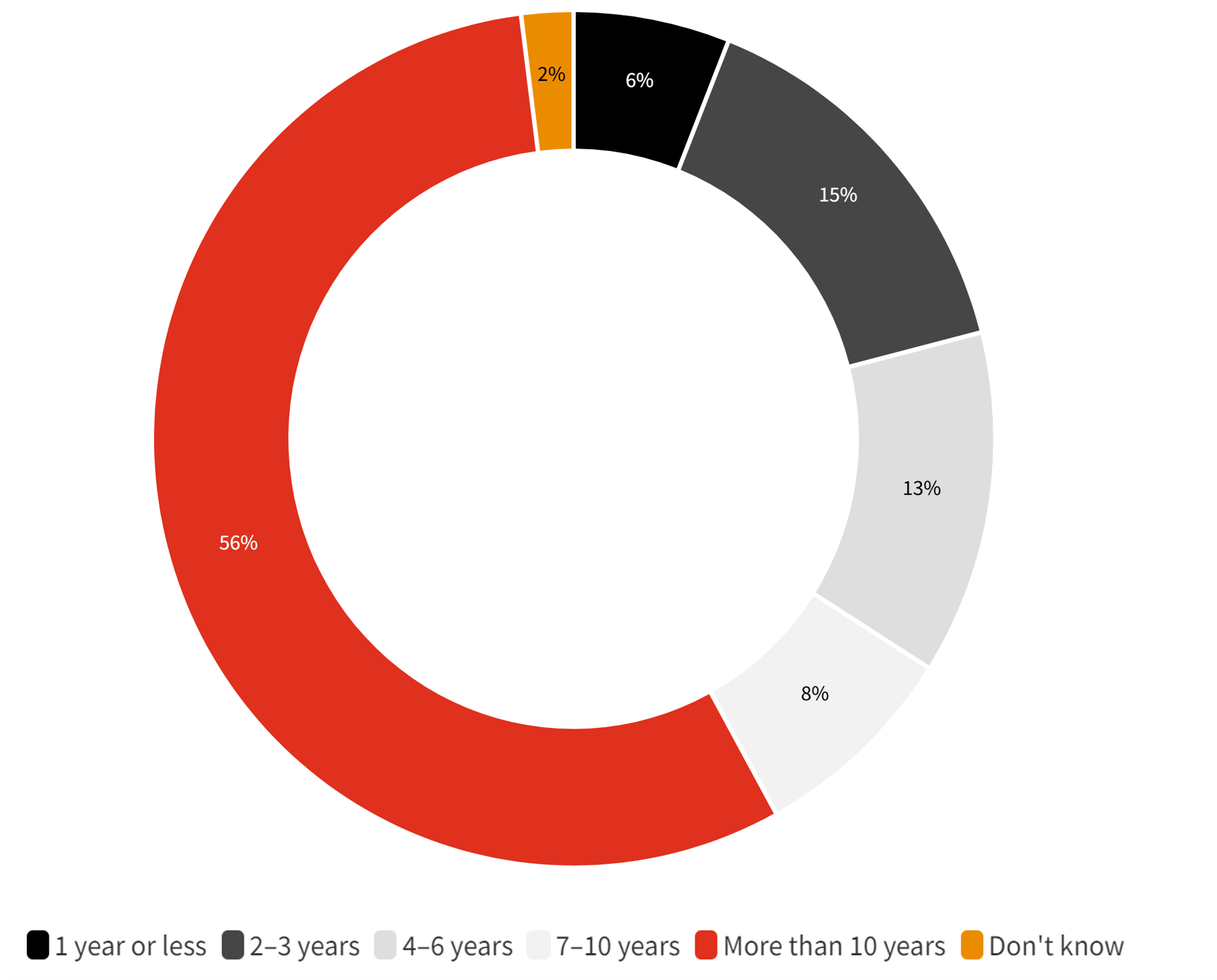


CEOs are very optimistic about the revenue growth of their companies in the short to medium term, being able to increase headcount and prices of products and services.
95% of CEOs exhibit confidence in the revenue growth of their companies over the next twelve months. Interestingly, when the time frame extends to three years, there is a slight decline in the overall confidence levels to 92%.
Q. How confident are you about your company’s prospects for revenue growth over the next 12 months?

42% of CEOs believe that their companies will increase headcount, whereas 65% foresee a rise in the prices of their products and services within the next twelve months.
Q. To what extent will your company increase or decrease the following in the next 12 months? A. Headcount B. Prices of products and services

CEOs believe that their companies will be highly or extremely exposed to the key threats of inflation (55%), macroeconomic volatility (47%) and geopolitical conflict (27%) in the next twelve months.
Climate change, despite its potential for far-reaching impacts, is not perceived as an immediate significant threat by most of the CEOs. Only 24% view their companies to be highly or extremely exposed to the threat of climate change in the next twelve months. It appears that the ramifications of climate change on business operations are not yet seen as a pressing issue by CEOs.
Q. How exposed do you believe your company will be to the following key threats in the next 12 months?

42% of the respondents believe that their companies will not be viable in a decade from now if they continue with their existing business models.
Q. If your company continues running on its current path, for how long do you think your business will be economically viable?

The same concern about the economic viability of the current business model has been raised by 45% of CEOs globally.

Although some businesses are looking towards few acquisition in the medium term for inorganic growth, in most of the businesses, growth is majorly expected only organically, especially through reallocating financial and human resources.

Government regulation is the most influencing factor with 77% of CEOs identifying it as a factor driving changes in the way their companies created, delivered and captured value in the last five years (to a large or very large extent). Further, 73% of the respondents believe that these regulations (to a large or very large extent) will remain the key factor in the next three years.
Results of the Survey reaffirm the need of enabling government regulatory environment for the businesses as without it, sustained growth may not be achievable despite businesses adopting new technologies for enhanced capabilities, developing new products and services, and implementing novel pricing models.
Q. Please indicate the extent to which the following factors have driven changes to the way your company creates, delivers and captures value in the last five years? Q. Please indicate the extent to which the following factors will drive changes to the way your company creates, delivers and captures value in the next three years?

CEOs believe that generative AI will result in little to no change in their company's headcount (58%) and revenue (55%) and profitability (52%) in the upcoming year.
Q. To what extent will generative AI increase or decrease the following in your company in the next 12 months?

Looking ahead to a three-year horizon, CEOs do recognise that generative AI is expected to majorly disrupt and change their business models with 69% agreeing that it will necessitate the development of new skills across most of their workforce, followed by 68% who agree that generative AI will profoundly transform the way their company creates, delivers, and captures value.
Further, 63% of CEOs anticipate an increase in competitive intensity within their industry, driven by factors such as new entrants, products or pricing approaches in the next three years.
Q. To what extent do you agree or disagree with the following statements about generative AI?

*Values less than 5% are not displayed numerically on the graph
Businesses currently seem to be in their early phase of implementation regarding climate related actions. Most significant climate related initiative on the agenda of the CEOs (93% responding that their actions relating to this have either been completed/in progress or are being planned) relates to achieving energy efficiency.
Innovation of new climate-friendly products, services and selling technologies that support customers' climate-resilience efforts follow energy efficiency initiatives. Lack of climate related technologies was identified as the most significant factor by the CEOs in their efforts to decarbonise their business
Q. Which of the following best describes your company’s level of progress on each of these actions?






